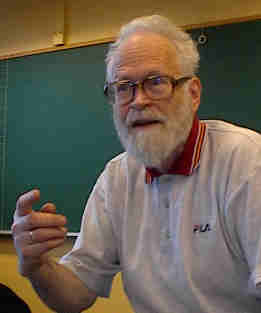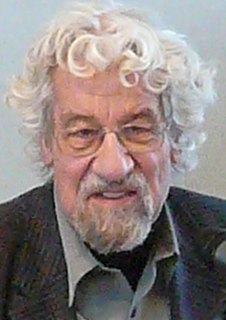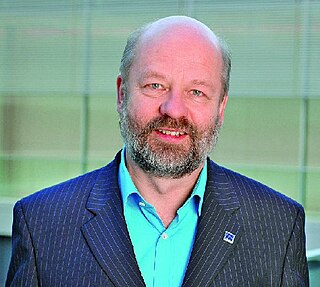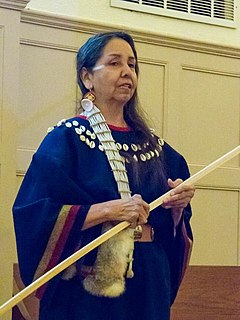
The Bulletin of the Atomic Scientists is a nonprofit organization concerning science and global security issues resulting from accelerating technological advances that have negative consequences for humanity. The Bulletin publishes content at both a free-access website and a bi-monthly, nontechnical academic journal. The organization has been publishing continuously since 1945, when it was founded by former Manhattan Project scientists as the Bulletin of the Atomic Scientists of Chicago immediately following the atomic bombings of Hiroshima and Nagasaki. The organization is also the keeper of the internationally recognized Doomsday Clock, the time of which is announced each January.

Wolfgang Paul was a German physicist, who co-developed the non-magnetic quadrupole mass filter which laid the foundation for what is now called an ion trap. He shared one-half of the Nobel Prize in Physics in 1989 for this work with Hans Georg Dehmelt; the other half of the Prize in that year was awarded to Norman Foster Ramsey, Jr.
Gordon Edwards is a Canadian scientist and nuclear consultant. Edwards was born in Canada in 1940, and graduated from the University of Toronto in 1961 with a gold medal in Mathematics and Physics and a Woodrow Wilson Fellowship. At the University of Chicago he obtained two master's degrees, one in Mathematics (1962) and one in English Literature (1964). In 1972, he obtained a Ph.D. in Mathematics from Queen's University.
Anti-nuclear organizations may oppose uranium mining, nuclear power, and/or nuclear weapons. Anti-nuclear groups have undertaken public protests and acts of civil disobedience which have included occupations of nuclear plant sites. Some of the most influential groups in the anti-nuclear movement have had members who were elite scientists, including several Nobel Laureates and many nuclear physicists.
Yvonne Margarula won the 1998 Friends of the Earth International Environment Award and the 1998 Nuclear-Free Future Award. She also won the 1999 U.S. Goldman Environmental Prize, with Jacqui Katona, in recognition of efforts to protect their country and culture against uranium mining.

The anti-nuclear movement in Kazakhstan, "Nevada Semipalatinsk", was formed in 1989 and was one of the first major anti-nuclear movements in the former Soviet Union. It was led by author Olzhas Suleimenov and attracted thousands of people to its protests and campaigns which eventually led to the closure of the nuclear test site at Semipalatinsk in north-east Kazakhstan in 1991. The movement was named "Nevada Semipalatinsk" in order to show solidarity with similar movements in the United States aiming to close the Nevada Test Site.
Jillian Marsh was raised in the coal-mining town of Leigh Creek, in South Australia’s Flinders Ranges, and she has had a long interest in mining issues and indigenous communities. In 1998 Marsh received the prestigious Jill Hudson Environmental Award for her work in educating people living near the Beverley Uranium Mine about the toxic dangers of uranium mining. In 2004 Marsh won a Doctoral candidacy at Adelaide University’s Geographical and Environmental Studies Department. Her PhD research topic is A Look at the Approval of Beverley Mine and the Ways that Decisions are Made When Mining Takes Place in Adnyamathanha Country. In 2008, Jillian Marsh received the Nuclear-Free Future Award.
Manuel Pino is a professor at Scottsdale Community College in Arizona, who comes from a village of the Tewa people west of Albuquerque, New Mexico. Opposition to uranium mining has played a central role in Pino's life. The theme for his sociology dissertation was The Destructive Impact of Uranium Mining on Native American Culture. He has spoken at many international conferences, including the 1992 World Uranium Hearing in Salzburg, Austria, about victims of uranium mining, depleted uranium, and associated cancer deaths. In 2008, Manuel Pino received the Nuclear-Free Future Award.

Non-Nuclear Futures: The Case for an Ethical Energy Strategy is a 1975 book by Amory B. Lovins and John H. Price. The main theme of the book is that the most important parts of the nuclear power debate are not technical disputes but relate to personal values, and are the legitimate province of every citizen, whether technically trained or not. Lovins and Price suggest that the personal values that make a high-energy society work are all too apparent, and that the values associated with an alternate view relate to thrift, simplicity, diversity, neighbourliness, craftsmanship, and humility. They also argue that large nuclear generators could not be mass-produced. Their centralization requires costly transmission and distribution systems. They are inefficient, not recycling excess thermal energy. The authors believed that nuclear reactors were less reliable and take longer to build, exposing them to escalated interest costs, mistimed demand forecasts, and wage pressure by unions.
Sun Xiaodi has spent more than a decade petitioning the central Chinese authorities over radioactive contamination from the No. 792 Uranium Mine in the Gannan Tibetan Autonomous Prefecture in Gansu Province. In 2006, he received the prestigious Nuclear-Free Future Award.
The late 1950s and early 1960s saw a strong push from the Spanish Government to establish a national nuclear power industry. In response to the surge in nuclear power plant plans, a strong anti-nuclear movement emerged in 1973, which ultimately impeded the realisation of most of the projects.

Ole Andreas Kopreitan was a Norwegian political activist, best known as an anti-nuclear activist. For 30 years he led the anti-nuclear organization "No to Nuclear Weapons".
The William and Katherine Estes Award, previously known as the NAS Award for Behavioral Research Relevant to the Prevention of Nuclear War is awarded by the U.S. National Academy of Sciences "to recognize basic research in any field of cognitive or behavioral science that has employed rigorous formal or empirical methods, optimally a combination of these, to advance our understanding of problems or issues relating to the risk of nuclear war". It was first awarded in 1990.
Ursula Sladek owns a small local power company, Schönau Power Supply, located in Schönau im Schwarzwald, Germany, that provides electricity from renewable energy sources to the German electricity grid. Her company "gets much of its energy from small local energy producers, including a handful of hydropower operations, solar panels, some wind turbines, and about 20 washing-machine-size co-generation plants in people’s homes that produce both heat for the home and electricity for the grid". Sladek has also been interested in finding ways of rendering nuclear power unnecessary in Germany: Sladek won a Goldman Environmental Prize in 2011.
The World Uranium Hearing was held in Salzburg, Austria in September 1992. Anti-nuclear speakers from all continents, including indigenous speakers and scientists, testified to the health and environmental problems of uranium mining and processing, nuclear power, nuclear weapons, nuclear tests, and radioactive waste disposal.











